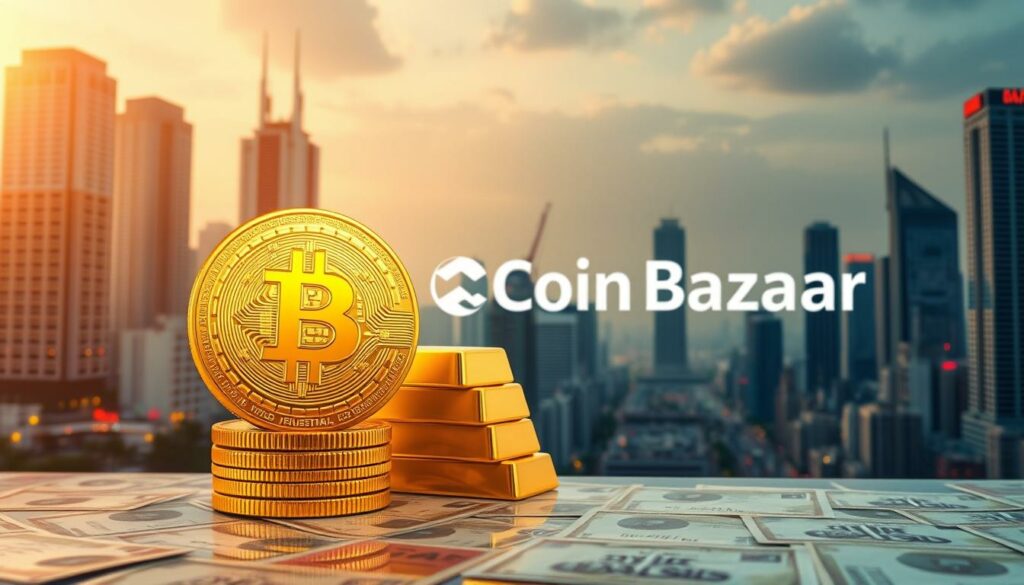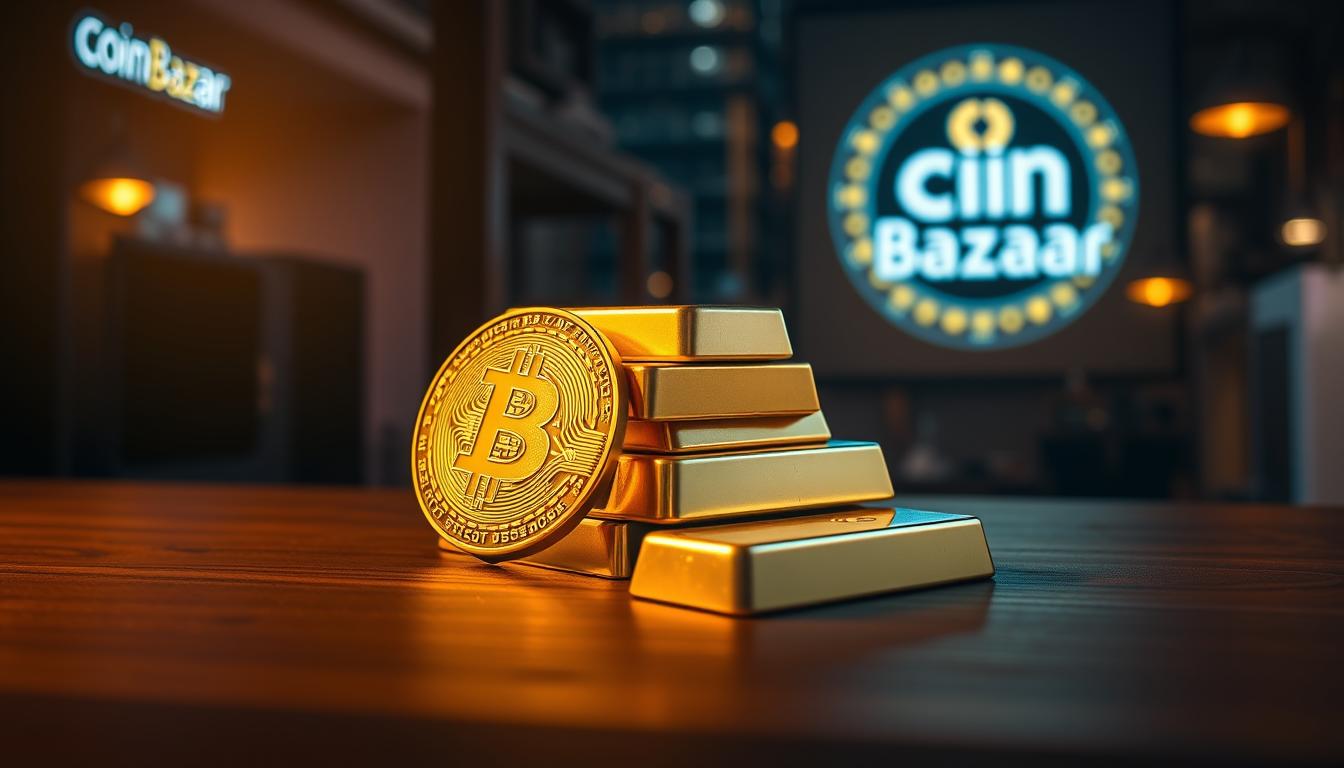Exclusive Deals & Trending Items


MMTC PAMP Silver Coin Laxmi Ganesh of 10 Gram in 999.9 Purity in Certicard & Capsule as per availability/Fineness
Shop NowIn India, gold has been a symbol of prosperity and good fortune for centuries. The way people invest in gold is changing, especially in Tier-2 cities. Now, more people are turning to digital gold, a convenient and accessible investment option.
Traditionally, Indians have chosen physical bullion for investment. But, digital platforms have made digital gold more popular. Now, you can invest in gold easily without the need to store physical gold.
The debate between digital gold vs physical bullion is growing. Physical gold offers a real asset, while digital gold is easier to buy and store. When comparing gold investment, you’ll see both have benefits.
Key Takeaways
- The gold market in India is witnessing a significant shift towards digital gold.
- Tier-2 cities are driving the demand for digital gold.
- Digital gold offers convenience and reduced storage costs.
- Physical bullion provides a tangible asset.
- Both digital and physical gold have their advantages in precious metal investing.
The Gold Investment Landscape in India
Gold is deeply loved in India, thanks to its rich culture and history. It’s not just a valuable metal but also a sign of wealth and luck.
Cultural Significance of Gold in Indian Society
In India, gold is very special, especially during festivals and weddings. People often give gold jewelry as gifts, showing its importance. This makes gold a favorite choice for many investors.


Evolution of Gold Investment Options
Gold investment choices in India have changed a lot over time. Before, people mostly chose physical gold. But now, investing in gold online is getting more popular. This has led to a debate between digital asset vs physical gold, each with its own benefits.
| Investment Type | Advantages |
|---|---|
| Digital Gold | Easy to buy and sell online, no storage concerns |
| Physical Gold | Tangible asset, can be used in jewelry and ornaments |
When picking your investment, knowing the differences between gold ownership comparisons is key. It helps you make a smart choice.
Digital Gold vs Physical Bullion: Understanding the Basics
It’s key to know the basics of digital gold and physical bullion to make smart choices. These two options meet different needs and tastes in gold investing.
What is Digital Gold?
Digital gold lets you buy gold online and store it electronically. It’s a safe and easy way to invest in gold without needing to keep it physically.
Key Platforms and Providers in India
In India, many platforms offer digital gold. Some top providers are:
- Mumbai-based MMTC-PAMP, a joint venture between MMTC Ltd. and PAMP, a well-known precious metals refiner.
- Other fintech companies that have added digital gold to their services.
How Digital Gold Works
Investing in digital gold means buying gold online, which is kept in vaults for you. You can buy, sell, or keep this gold as you see fit.
What is Physical Bullion?
Physical bullion is gold in its solid form, like coins, bars, or other items. Investing in physical bullion lets you own real gold, adding value to your portfolio.
Types of Physical Gold Products
Physical gold products include:
| Type | Description |
|---|---|
| Gold Coins | Minted coins, often with official stamps, available in various weights and purities. |
| Gold Bars | Bars of gold, ranging from small weights like 1 gram to larger bars like 1 kilogram. |
| Jewelry | While not always considered an investment, gold jewelry can be a form of physical gold ownership. |
Traditional Purchasing Methods
You can buy physical gold from local jewelers, banks, or online shops. Always check the gold’s authenticity and purity before buying.


Knowing the differences between digital gold and physical bullion is key for smart investing. Both have benefits, and your choice depends on your personal preferences and goals.
The Rise of Tier-2 Cities as Investment Hubs
India’s economy is growing, and Tier-2 cities are becoming key places for investment. You’re part of a trend where smaller cities play a big role in investing.
Economic Growth in Smaller Urban Centers
Tier-2 cities are seeing fast economic growth. This is thanks to better infrastructure and more spending by consumers. This growth opens up new chances for investors, making these cities great for gold investments.
These cities also see more people with money to spend. This boosts investment even more.
Changing Investment Patterns
Investment patterns in Tier-2 cities are changing. Now, people are looking at digital gold more. Digital platforms make it simpler to invest in gold online.
Shift from Traditional to Modern Investment Options
People used to prefer physical bullion. But now, digital gold is gaining ground. This change is because digital options are more convenient and secure.
Impact of Increasing Disposable Income
With more money to spend, people in Tier-2 cities want to invest in different things. Gold is one of them. Now, comparing digital gold to physical bullion matters a lot to investors.
You might think about the good points of both digital and physical gold. You’ll consider things like safety, how easy it is to sell, and how simple it is to buy.
Current Popularity Trends in Tier-2 Cities
In Tier-2 cities, a big change is happening in gold investment. People are now choosing both digital gold and physical bullion more than before.
Digital Gold Adoption Rates
Digital gold is becoming very popular in Tier-2 cities. It’s easy to invest in and you don’t need to store it physically.
City-Specific Trends
Some cities are leading in digital gold adoption. Cities with better internet are seeing more people choose digital gold.
Growth Trajectory
The future looks bright for digital gold in Tier-2 cities. As more people learn about its benefits, more will choose it.
Physical Bullion Ownership Statistics
Even with digital gold’s rise, physical bullion is still popular. People like the real feel of holding gold.
Regional Variations
Physical bullion ownership varies by region. Areas with a big love for gold have higher rates.
Generational Preferences
Age also affects gold choices. Older folks often prefer physical gold. Younger ones are more into digital gold.
In short, the choice between digital gold and physical bullion in Tier-2 cities depends on many things. These include city trends, regional differences, and age.
Accessibility Factors Influencing Investment Choices
Accessibility is a big deal when it comes to investing in gold. How easy it is to get to different investment options can really shape your choices.
Digital Platforms Availability in Tier-2 Markets
Digital platforms in Tier-2 markets have changed the game for gold investment. Now, you can invest in digital gold from home. Investing in gold online makes it easy to add variety to your portfolio.
As more people learn about digital tech and get online, more will use digital gold platforms. Digital gold is a safe and easy way to invest in gold, without needing to store it physically.
Physical Gold Retailers Network
For those who like physical bullion, the network of gold retailers in Tier-2 cities is key. Trusted local jewelers and dealers offer secure gold storage options and the chance to hold your gold in hand.
But, the number of physical gold retailers can differ a lot between cities. This affects how easy it is to buy and sell physical gold.
“The traditional appeal of physical gold continues to attract investors who value the tangibility of their investments.”
Cost Comparison: Digital Gold vs Physical Bullion
It’s important to look at the costs of digital gold and physical bullion before deciding. Several factors affect these costs.
Purchase Costs and Premiums
The cost of buying gold is a big deal. For physical bullion, you pay for the gold, plus making charges and markups.
Making Charges and Markups
Making charges are fees for turning gold into coins, bars, or jewelry. These fees can differ a lot between sellers.
Platform Fees vs Retailer Margins
Digital gold platforms charge a premium over gold’s spot price. This is often lower than what physical bullion retailers charge.
| Cost Component | Digital Gold | Physical Bullion |
|---|---|---|
| Purchase Premium | Low | Variable |
| Storage Fees | Minimal | High |
Long-term Storage Expenses
Storage costs are key to consider. Digital gold has very low storage costs since it’s stored online.
Digital Storage Fees
Some digital gold platforms might charge a small fee for storage. But this is usually minimal or free.
Physical Security Costs
Physical bullion needs secure storage, which can be expensive. You can store it in a home safe, a bank locker, or a third-party vault. Each option has its own costs.
“The cost of storing physical gold can be substantial, including the cost of a safe or a bank locker.”
Looking at digital gold and physical bullion, each has its own cost benefits and drawbacks. Your choice should depend on your financial goals and what you prefer.
Security Considerations for Both Investment Types
When looking into gold investments, knowing about security is key. Both digital gold and physical bullion have their own security worries. These worries can affect your investment choices.
Digital Security Concerns
Digital gold isn’t safe from cyber threats. The sites that handle digital gold can be at risk of hacking and cyber attacks.
Platform Reliability
How reliable the digital platform is matters a lot. Pick platforms known for their security and openness about their safety steps.
Cybersecurity Risks
There are risks like phishing, data breaches, and unauthorized transactions with digital gold. Using strong passwords and two-factor authentication can help protect against these threats.
Physical Storage Risks
Physical bullion also has its own storage risks. The safety of your gold depends on where and how it’s stored.
Home Storage Challenges
Keeping gold at home can be risky due to theft or loss. If you store gold at home, use a safe or a locked cabinet.
Bank Locker Alternatives
Bank lockers are a safer option for storing physical gold. They offer strong security and are usually insured against theft or loss.
| Security Feature | Digital Gold | Physical Bullion |
|---|---|---|
| Cybersecurity | High Risk | Low Risk |
| Storage Risk | Low Risk | High Risk |
| Platform Reliability | Critical | Not Applicable |
In conclusion, both digital gold and physical bullion have their own security concerns. Knowing these risks helps you make better investment choices. By picking secure storage and being aware of risks, you can safeguard your investment.
Liquidity and Ease of Transactions
How easy it is to sell your gold depends a lot on whether it’s digital or physical. Knowing about liquidity is key when you decide to invest in gold.
Selling Digital Gold
Digital gold is very liquid because you can easily move it online. You can sell it with just a few clicks, making it a great choice.
Redemption Processes
Most digital gold sites make it easy to turn your gold into physical or cash. This makes the process simple.
Transfer Options
You can send digital gold to others or get it in your bank account. This gives you a lot of freedom with your investments.
Liquidating Physical Bullion in Tier-2 Cities
It’s harder to sell physical gold, especially in smaller cities. The gold market might not be as active there.
Local Market Dynamics
The value of physical gold changes based on the local market. This includes who’s buying and the current gold prices.
Price Realization Challenges
When you sell physical gold, you have to negotiate prices. You might struggle to get the best price for your gold.
| Investment Type | Liquidity | Ease of Transaction |
|---|---|---|
| Digital Gold | High | Easy online transactions |
| Physical Bullion | Variable | Dependent on local market |
Tax Implications for Gold Investments
The tax rules for gold investments differ between digital and physical forms. This affects your investment plan. Knowing these rules helps you make better choices.
Taxation on Digital Gold
Digital gold is seen as a capital asset. Gains from selling it are taxed as capital gains. If you keep it for over three years, the gains are taxed less.
Remember, tax rates and holding periods can change. Always talk to a tax expert.
Taxation on Physical Bullion
Physical bullion is treated as a commodity. It has its own tax rules. In some places, selling physical gold doesn’t attract GST or VAT. But, this can vary.
When you sell physical bullion, you might face capital gains tax. But, the way gains are calculated and tax rates differ.
It’s key to understand these tax rules for a gold investment comparison. Your choice between digital gold and physical bullion depends on your financial goals, investment time frame, and tax situation.
Technological Adoption in Tier-2 Cities
Technological adoption in Tier-2 cities is changing how people invest in gold. More people have internet access and know how to use it. This makes it easier for them to manage their investments.
Internet Penetration and Digital Literacy
Internet use and digital skills are growing fast in Tier-2 cities. More folks are getting used to digital platforms. This change has made it simpler to invest in digital gold and compare prices online.
Smartphones and internet plans are getting cheaper. This means investors have more info on gold investments at their fingertips.
Impact on Investment Preferences
Technology is changing what people want to invest in. More are choosing digital gold over physical gold. They like its convenience, security, and how easy it is to buy and sell.
A comparison of investment preferences is shown in the table below:
| Investment Feature | Digital Gold | Physical Bullion |
|---|---|---|
| Convenience | High | Low |
| Security | High | Dependent on storage |
| Ease of Transaction | High | Low |
Digital gold has clear benefits for today’s investors. As technology spreads, this trend is likely to grow in Tier-2 cities.
Demographic Analysis of Investors
Exploring gold investments, we see how age and income shape choices between digital gold and physical bullion. Knowing these trends helps us understand what different investors prefer and do.
Age Groups and Their Preferences
Age greatly affects whether someone chooses digital gold or physical bullion. Each age group has its own way of investing.
Youth Trends
Young investors like digital gold because it’s easy to use, costs less, and feels modern. They’re okay with online deals and like digital gold’s flexibility.
Middle-Aged and Senior Investors
But, middle-aged and older folks often go for physical bullion. They want something real and traditional. They worry about the safety and realness of physical gold.
Income Levels and Investment Choices
Income also plays a big part in choosing between digital and physical gold. People with different incomes have different ways of investing.
Middle-Class Investment Patterns
The middle class usually picks digital gold. It’s cheaper and lets them invest small amounts often. Digital gold is easy for them to get into, fitting their budget.
High-Net-Worth Individual Preferences
But, the rich might choose both digital gold and physical bullion. They want the safety and variety of physical gold. At the same time, they like digital gold’s ease and flexibility.
In summary, age and income really shape whether someone chooses digital gold or physical bullion. Knowing these patterns helps investors make choices that fit their needs and goals.
Trust Factors: Traditional vs Modern Investment
Investing in gold is all about trust. The choice between traditional physical gold and modern digital gold is a big one. Trust is a key factor in this decision.
Cultural Trust in Physical Gold
In India, physical gold has been a trusted investment for centuries. It’s deeply rooted in cultural and traditional practices. The tangible nature of physical gold gives investors a sense of security and trust.
- Tangible Asset: Physical gold is something you can hold and store.
- Cultural Significance: Gold is used in cultural and religious ceremonies, making it more trustworthy.
- Historical Value: Physical gold has been a reliable store of value for generations.
Building Confidence in Digital Assets
While physical gold has its perks, digital gold is becoming more popular. Its convenience and modern appeal are drawing people in. Building trust in digital assets is key for its growth.
To boost trust in digital gold, consider these points:
- Secure Platforms: Invest through reputable and secure digital platforms.
- Transparency: Provide clear information about gold holdings and storage.
- Regulatory Compliance: Make sure digital gold investments meet regulatory standards.
Case Studies: Successful Gold Investors in Tier-2 Cities
Gold investment is booming in Tier-2 cities. People are seeing big wins with both digital and physical gold. They’re using gold to mix up their investments and make good money.
Digital Gold Success Stories
Digital gold is changing lives in Tier-2 cities. A young investor from a smaller town made a lot of money with digital gold. The easy transactions and low storage costs made it a hit.
“Investing in digital gold was the best choice I made,” says Rohan, a successful investor. “The platform was easy to use, and the profits were great.”
Physical Bullion Investment Wins
Physical bullion has also brought success. An investor from a Tier-2 city bought gold coins and bars. They grew in value over time. The realness of physical gold gave him confidence in his investment.
Suresh is another example. He bought physical gold and sold it for more when the market went up. His story shows the value of mixing up investments.
Future Projections for Gold Investments in Tier-2 Cities
The future of gold investments in Tier-2 cities is set for big changes. You, as an investor, will see a new way of looking at gold in these cities.
Digital platforms and more internet use will shape gold investment trends in Tier-2 cities. Digital gold will be a big player in this change.
Expected Growth of Digital Gold
Digital gold is expected to grow a lot in Tier-2 cities. It’s easy, safe, and simple to use. This will draw in more investors.
You’ll see more people using digital gold platforms. This is because more people are getting online and using financial services online.
Outlook for Physical Bullion Market
The physical bullion market in Tier-2 cities has a mixed outlook. Even though people still like physical gold, digital gold is getting more popular. You might see more secure ways to store physical gold or a mix of digital and physical gold.
In conclusion, the future of gold investments in Tier-2 cities will blend digital and physical gold. Digital gold is likely to be more popular because of its benefits. As an investor, you’ll have many choices to fit your needs.
Conclusion: Making the Right Gold Investment Choice
You now know a lot about gold investments in Tier-2 cities. You’ve learned about digital gold and physical bullion. It’s key to think about the good and bad of each option.
A gold investment comparison shows digital gold is easy to use and saves on storage. But, physical bullion gives you a real asset and feels safer. Your choice between digital gold vs physical bullion depends on what you like, your goals, and the market.
If you like investing in gold online, digital gold is a good pick. It’s flexible and easy to sell. But, if you prefer something more traditional, physical bullion is a solid choice.
Think about your financial goals and how much risk you can take. This will help you choose the best option for you. As the gold market changes, staying up-to-date is important for your investments.



















